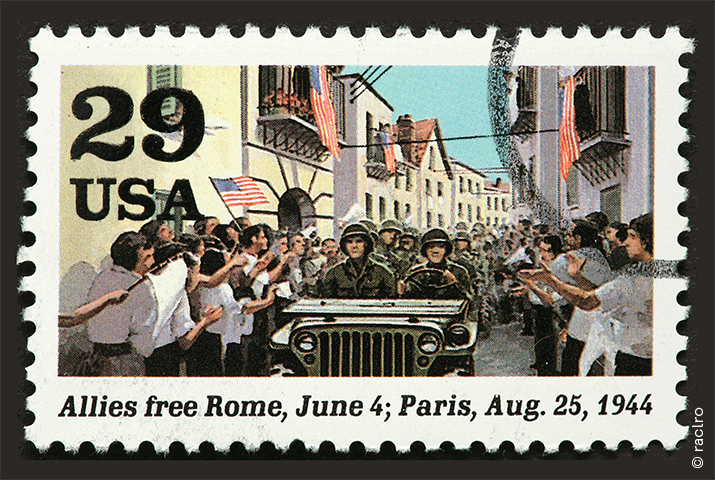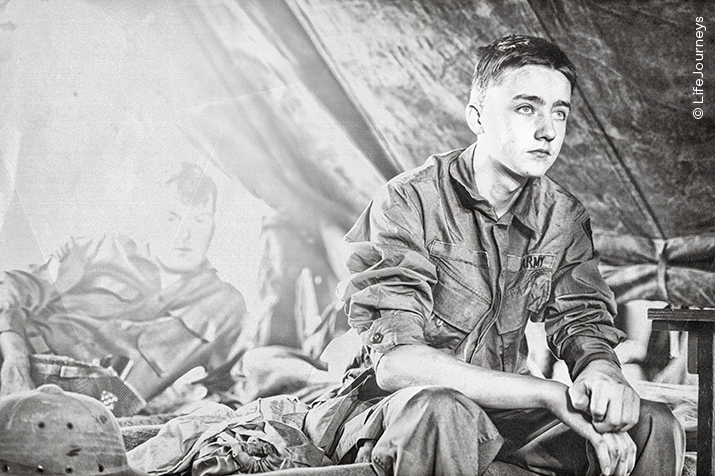EIGHTY YEARS ON FROM THE END OF WORLD WAR II
It always feels like the first time. The first time of a 'war that is fair', the first time that 'it cannot be avoided'. And yet it's not the first time, but 80 years after the end of the Second World War, we've forgotten. That event changed the geopolitical, moral and cultural coordinates of the world forever, caused over 60 million deaths, and the systematic extermination of peoples, breaking up cultures and annihilating cities. It is a defeat for humanity, even before it is a defeat for politics. Yet, eight decades later, the lesson of so much suffering still seems largely unheeded.
Wars continue to stain the planet with blood, almost always for the same reasons. In Ukraine, in the Middle East, in Africa, in Asia, the language of force remains, which is all too often the only one used to address geopolitical issues. Armed oppression as an instrument of domination persists. Despite Hiroshima and Auschwitz, despite the physical and moral ruins of the 20th century, old patterns repeat themselves: disinformation, rhetoric, the construction and dehumanisation of the enemy. Yet it is not only the leaders of the bombing nations who promote warmongering views, but also people like us—convinced that violence is the only possible way out.
Those who believe in the power of dialogue must think that war is not a destiny, but a choice
Sometimes they are real men and women, often it is propaganda, which has always been there but is now more refined. Expert communicators hiding in the shadows of the web pretend to be mothers who have seen their child killed, war widows, veterans or experts on anything, in a bid to convey preconceived theses with the sole purpose of creating opinions in society in support of the war effort. It’s a new kind of communication that demands a different kind of attention, but ultimately it draws on age-old feelings—those who drive us to see others, those who are different, as the source of our discontent.
The struggle between peoples for power has deep roots, planted well before the 20th century. Classical mythology already presents war to us as a structural element of the human condition. Achilles and Hector, in Homer's Iliad, are heroes and victims of the same logic: honour, revenge, glory, all through violence. "Sing, goddess, the anger of Achilles, son of Peleus, that destructive wrath which brought countless woes upon the Achaeans" is the line that opens the founding poem of western civilisation. 'Destructive Wrath', not peaceful Peace. But the same masterpiece also shows the despair of mothers, the weeping of friends, the disintegration of the community. What we see today in the news, for those who still watch it, or on social media, which most of us use. Homer may have thought that this example would have helped us avoid falling into the tragic trap of war justified by a noble end, but it does not seem to have been successful.
It almost seems as if classicism wants to tell us that conflicts are inevitable even if they bring tragedy, and ancient history, too, seems to confirm this view. Although the Roman empire is the bearer of an idea of order and law, it was founded on centuries of military expansion. The pax romana was the result of the Roman war. And these are not old things that have no importance or influence on the present. Several centuries later, indeed, Europe followed the same pattern at the end of the Great War: Peace imposed by the victor, with the result that the fighting started again after a few years.
Multilateral institutions, albeit imperfect, are still the most effective tools for containing conflicts and fostering diplomatic solutions
The second half of the 20th century seemed to have broken this logic, seeing the emergence of multilateral institutions with the declared aim of averting new conflicts. The United Nations, the Council of Europe, and the European Union were designed to prevent the use of force, to foster dialogue, to protect rights. They have succeeded in some areas of the planet, failed in others, sometimes achieved partial results, but those who criticise these organisations should be reminded that when the world fell into the abyss of World War II, 80 years ago, the UN was not there, the EU was not there, the Council of Europe was not there.
The United Nations has played a key role in maintaining Peace in many areas of the world. It is true, it is often paralysed by mutual vetoes, but perhaps the time has come to improve how it operates: we need more UN, not less. The Council of Europe promoted the European Convention on Human Rights, which remains one of the most advanced texts on the subject today. The EU, despite many limitations, has ensured decades of Peace on a historically war-torn continent. The alternative to multilateralism is nationalism; mankind has already tried this and it did not go well.
Despite everything, however, war continues to return with some regularity. Always for the same 'inalienable and noble' reasons. Russian aggression against Ukraine has brought the conflict back to the heart of Europe. Civilians struck, indiscriminate bombing. The war propaganda is always the same, 'we do it to defend ourselves'. The same one that is being used in the Middle East by Israel, which is waging two wars at the same time. On the one hand, there is the offensive in the Gaza Strip, officially aimed at eliminating Hamas terrorists, but in reality resulting in the mass killing of Palestinian civilians.
On the other side there is the bombing of Iran, justified by Tel Aviv with claims that the country is close to developing a nuclear weapon. There is no doubt that a handful of dictators rule in Tehran, oppressing the civilian population. The real question is whether this is a strategy that truly works to ensure Israel’s security—and, above all, whether there is a genuine threat.
The United Nations has played a key role in maintaining Peace in many areas of the world.
We will probably know too late, as happened just over twenty years ago when Saddam Hussein's Iraq was accused of having weapons of mass destruction that it did not possess. Hussein was a bloodthirsty, unjustifiable dictator, but we now know that when in 2003 the then US Secretary of State Colin Powell presented a report to the UN directly accusing Baghdad of possessing 'chemical weapons capable of killing thousands of people', the 'evidence' shown on world television were vials filled with a white powder that was not anthrax as claimed, and was not even harmful, but could be easily sprinkled on the skin after a shower, it was talcum powder. Baghdad was occupied, the regime fell, Hussein was captured and sentenced to death, no weapons were found, chaos reigned in Iraq, not Peace as was intended.
It feels like we keep coming back to square one, like a tragic game of snakes and ladders that periodically forces us to relive the same tragedies. The only difference is the technology, which changes how war is fought, but not its essence.
Theodor W. Adorno, witness of the Shoah and author of Negative Dialectics, argued that 'writing a poem after Auschwitz is an act of barbarism'. A statement that expresses the crisis of humankind. Of course, it was the German philosopher himself who made it clear that it is not poetry itself that is barbaric, but turning a blind eye to what happened.
Eighty years after the end of the Second World War, the best way to honour the dead is not to remember heroic deeds but to strive so that they are no longer needed
And perhaps then it should actually be culture that confronts horror, instead of erasing it. In this sense, poetry can still say something. "Glorious is the fate of the dead at Thermopylae, noble their destiny; their tomb is an altar, remembrance replaces mourning, and lament becomes praise" wrote Simonides of Ceos, who lived in the fifth century before Christ, commemorating the fallen. For Horace, however, 'it is sweet and dignified to die for one's homeland'. After the Holocaust, it is time to move on. Paul Celan tried this in the 20th century. With his Death Fugue, he sculpted the image of the absurdity of evil, denouncing horror with a broken, torn language. Poetry won’t save us, but it preserves memory. And in an era that tends to forget, this is no small thing.
Those who believe in the power of dialogue must think that war is not a destiny, but a choice Peace is fragile, of course, but it can be built. The international institutions, however imperfect they may be, are still the most effective tools we have for containing conflicts and fostering diplomatic solutions. What we need are reforms, political will, culture, and memory.
Eighty years after the end of the Second World War, the best way to honour the dead, the victims, the survivors, is not to remember heroic deeds but to strive so that they are no longer needed 'Those who do not remember the past are condemned to repeat it,' is written on the monument at the entrance to the Dachau concentration camp. It is translated into thirty languages, so there are no excuses for not understanding it.
mf








